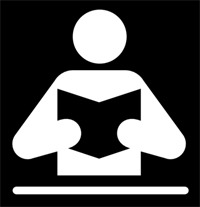By Joe Moore
 Every writer has to ask this question. The more you can define your reader, the stronger your voice will be in speaking to him or her. Is your reader your neighbor or your co-worker? Is she the checkout lady at the super market or the bank teller at the drive-thru? What about a fellow writer friend? Is he your reader? It’s only natural to look at all these people and everyone else in your life as your reader. But you may be wrong to do so.
Every writer has to ask this question. The more you can define your reader, the stronger your voice will be in speaking to him or her. Is your reader your neighbor or your co-worker? Is she the checkout lady at the super market or the bank teller at the drive-thru? What about a fellow writer friend? Is he your reader? It’s only natural to look at all these people and everyone else in your life as your reader. But you may be wrong to do so.
I believe that the chances of any of these people being your reader or target audience are slim to none. Yes, each one of them may share some of your interests, hobbies, tastes, lifestyle and background. But there are no perfect matches to you. Well, at least with the exception of one. And that is the answer to the question. Your reader is you. You are the reader to whom you should be writing. For in doing so, your natural voice will emerge.
Your voice is the storyteller that speaks within the imagination of your reader—the projectionist creating the mental movie. It is the direct link you use to communicate the story from the page into the mind of your reader.
If you consider yourself the primary reader of your story, you will naturally avoid over-writing, clutter, over-explaining, unnecessary backstory, clumsy dialog and excessive tags. Telling yourself the story doesn’t involve bloated exposition. Telling yourself the story will make for crisper, cleaner, easier-to-understand prose.
It’s such a simple technique, most writers overlook it. When you write for yourself, you don’t have to have much explained to you. Remember that your reader (you) knows what you know at any given point in the story. So rather than talking at the reader, you’re talking to him as you would yourself. It becomes personal, close, intimate, clean, sharp-edged.
You can’t be everything to everyone—there’s too much difference between you and the teller at the bank or the checkout lady. But if you consider yourself as your primary audience, your true voice will come through loud and clear, and all those other people will then become your readers.
——————————–
Suspense Magazine called THE BLADE "One incredible suspense thriller." See for yourself at http://tinyurl.com/bdkjqr7

Nice tips, Joe. I look at my readers the same way I look at myself as a reader: someone who wants an entertaining escape from reality, who wants to immerse herself in another world, and who wants to consider series characters as friends. If I provide the same factors to my readers that I look for in a read myself, I feel I’ve done my job.
Love this, Joe. I’ve often said that since I’m an avid reader, then I am the market that any publisher is trying to reach. So write the kind of book you would read. That notion is liberating.
I’ll put that on my wall.
Great advice- – and a great method to keep the pretentious voice to a minimum.
Well put. I used to try to write how I thought books were “supposed to” read. That got me nowhere. Now I write the book I’d like to read, and, while I haven’t gotten far, things have been much better, and a contract has resulted.
The writing is all we can control, so we as writers need to be happy with it. Publication and sales are ultimately beyond our control–we can’t make someone publish, or read, our work–so personal satisfaction with the writing is what we have to shoot for.
This is so true. For me, writing is like talking to myself. I’m my most favorite company when deep in thought.
I like the idea of not having to over-explain.
Critic: So why did your protagonist do what she did?
Me: Why do you ask?
Critic: Because I’m interested to know.
Me: Do you plan to continue reading?
Critic: Yes!
Me: Then you will find out.
😀
I’m putting this on up on my wall, Joe. Thanks. I just knew I had a reader out there, somewhere.
And it’s ME!
Thanks for the comments, everyone. Bottom line: write the book you’re dying to read.
As I began reading this post, I got past the bank teller lady, then paused to think. After a bit of contemplation, I concluded my reader is really ME, and possibly my friend Carol.
Then, I continued reading, and realized I’d passed the test!
Thank you for the wise words, and the reminder that it is really that simple.
Thank you, Diane. Glad to hear it was useful.
Thank-you…. I think I’d kind of found my way to this by accident. That’s why I keep pounding at my couple revisions. When I read it and love it (after reading it many times), warts and all, and I still love it- I know I gotta polish it and finish it. It is the book I want to read.
You’re on the right track, Chaco. Keep it up.